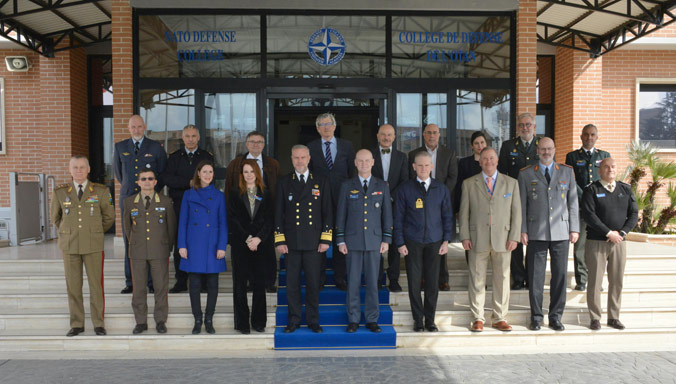Download NATO’s broadcast-quality video content free of charge

Log in
NATO MULTIMEDIA ACCOUNT
Access NATO’s broadcast-quality video content free of charge

Check your inbox and enter verification code
You have successfully created your account
From now on you can download videos from our website
Subscribe to our newsletter
If you would also like to subscribe to the newsletter and receive our latest updates, click on the button below.
Enter the email address you registered with and we will send you a code to reset your password.
Didn't receive a code? Send new Code
The password must be at least 12 characters long, no spaces, include upper/lowercase letters, numbers and symbols.
Your password has been updated
Click the button to return to the page you were on and log in with your new password.
On 19th and 20th February 2024, the NATO Defense College Academic Advisory Board (AAB) convened its 53rd annual meeting in Rome, Italy. The AAB advises the Commandant on ways in which to improve the academic, research and outreach activities of the College, to enhance links with NATO HQ and Allied Command Transformation, and to ensure that the College’s outreach strategies align with those of the Alliance.
The meeting began with Opening Remarks from the Commandant of the NATO Defense College (NDC), Lieutenant General Max Nielsen and the Chair of the NATO Military Committee, Admiral Rob Bauer. As Chair of the AAB, Admiral Bauer laid out the agenda and objectives for the meeting, adding, that “these discussions provide the AAB and the NDC with an excellent opportunity to explore current and future requirements NATO may have in the domains of education, training as well as research and innovation”.
The Board received an update from the Director of the NDC’s Research Division, Dr. Florence Gaub who briefed on the 2024 Research Plan, the College’s most recent publications and new areas to be exploited. The Board also received an update on the NDC’s ongoing education programme as well as the scheduled exercises for 2024, and an update on NDC engagement activities.
In his closing remarks, Lieutenant General Nielsen highlighted his desire to find ways for the NDC to support NATO. “In order to do that, the guidance from the Academic Advisory Board, some of our most important stakeholders, is crucial to help us identify areas where we can improve and innovate our education, research, engagement, and enablement tasks for the betterment of our Alliance and our partners”, he concluded.
Admiral Bauer commended the NDC for the essential role it has been playing in the education of NATO’s future leaders and highlighted the excellent work the College has been doing with its outreach to Partners. “All in all, over 60 nations are able to attend these courses and benefit from this international environment, which enables Allied and Partner participants to engage with each other, learn from each other and encourage their personal growth”, he remarked.
Concluding the meeting, Admiral Bauer encouraged the NDC to continue “striving for excellence, and to maintain its status as the Alliance’s premier education and training institution, as well as its leading research and innovation facility”.
On the side-lines of the AAB meeting, Admiral Bauer gave a lecture to the members of the Senior Course, the NATO Regional Cooperation Course and the ongoing Modular Short Course on “NATO’s new Era of Collective Defence”. Participants included military and civilians representatives from 40 NATO and Partner Nations.

Other members of the Board in attendance: Ms Marie-Doha Besancenot (NATO International Staff); Vice Admiral Guy Robinson (ACT Representative); Major General Davide Re (ACO Representative); Major General Tiberiu Serban (NATO International Military Staff); Mr Mr Fergal Anthony O’Regan (European Security Defense College); Dr Bernard Finel (Marshall Center); Dr Pierre Razoux (FMES Institute), Professor Andrea Prencipe (Rector of LUISS); and Dr Jamie M. Johnson (Leicester University).

